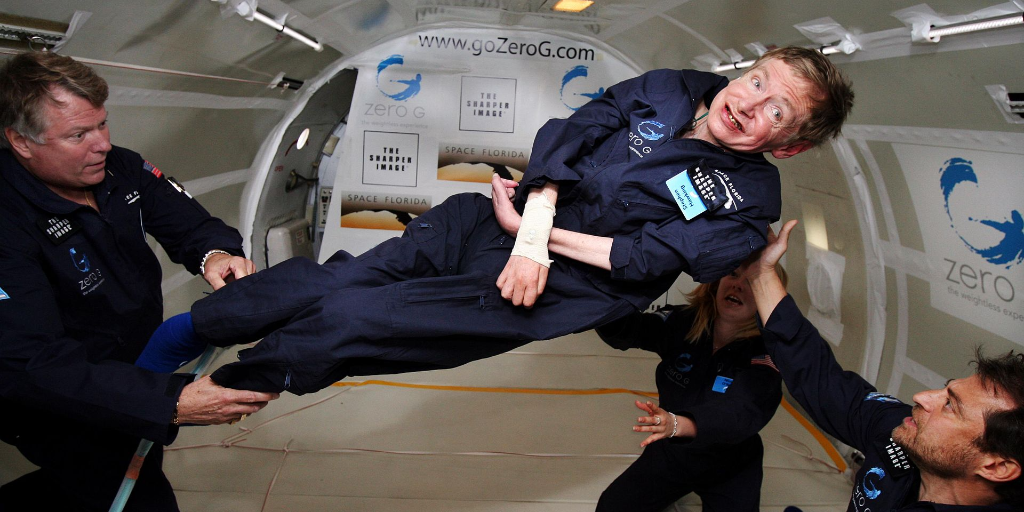The physicist Stephen Hawking has died at age 76
Welcome to Plain English, the podcast that goes at just the right speed for English learners. Today is Thursday, March 22, and on today’s topic is the physicist Stephen Hawking. You probably know him as the scientist who pondered the question, where did the universe come from? In the second half of today’s program, I’ll show you how to use the English phrase, “do justice” to something.
Today is episode 31, so you can find a transcript of today’s program at PlainEnglish.com/31. You can read the transcript as you listen, so you can associate the sounds you hear with the words as they are written. Spanish, Portuguese, Chinese, and French speakers can also take advantage of the instant translations of difficult words and phrases on the web site. PlainEnglish.com/31 for today’s transcript.
And if you’d like to get an e-mail summary of every show, with additional English words and phrases and links to the English articles I use to prepare the show, go to PlainEnglish.com/mail to sign up.
Let’s get going on today’s main topic.
Physicist Stephen Hawking dies
The world-famous physicist Stephen Hawking died last week at age 76. He is known for pondering the essential question of where the universe came from, and for communicating through a computerized voice.
Dr. Hawking was born 300 years to the day after the famous Renaissance scientist Galileo died. Galileo was one of the first to study the concept of gravity, which figured prominently in Dr. Hawking’s on research.
Dr. Hawking’s career focused on gravity and the properties of black holes—pits of matter so dense that not even light can escape their gravitational pull. He is credited with helping to bridge the divide between independent theories of physics that covered the very large and the very small, into one theory that explains properties of both. His paper describing the theory was described as the most beautiful paper in the history of physics.
And that’s where I’m going to stop trying to talk about his actual work—since I know very little about physics and I know my descriptions can’t do justice to his work. For people like me, he wrote a book called “A Brief History of Time: From the Big Bang to Black Holes” in 1988, which sold more than 10 million copies. A 2014 movie “The Theory of Everything” was based on his life; the actor who played him won an Academy Award.
Stephen Hawking was born in Oxford, England, and attended University College, Oxford, where he found physics and mathematics boring because they were too easy. After graduating, he switched to England’s other famous university, Cambridge, for graduate school.
While he was there, in 1963, he learned he had the disease ALS. Known in the US as Lou Gehrig’s disease, so-named after the most famous person at the time to suffer from it, ALS attacks the nervous system and prevents a person from voluntarily using muscles for basic things like walking, chewing, and speaking. The disease gets worse over time and the average survival rate is three years; Stephen Hawking lived over fifty years after his diagnosis.
By 1980, seventeen years after his diagnosis, he needed the help of a nurse to perform daily activities. He caught pneumonia in 1985; it was so bad, doctors put him on life support. When his chances for survival looked grim, doctors asked his wife if his life support should be turned off, but she said no. He eventually recovered, but without use of his voice.
Having lost his voice and almost all muscular functions, it appeared he could only communicate by laboriously pointing at letters on a board to spell words—a limitation that could have killed his ability to communicate all but the most basic concepts. But a computer researcher wrote a program that would let Dr. Hawking choose words from a library and speak through a computer. He could control it through his finger or by blinking his eye. The computer program also allowed him to use the internet and phone independently.
Non-scientists like me will remember the distinctive voice, but also his humor in using it. Sometimes, when he introduced himself, he would say, “Please pardon my American accent,” which was funny since the American accent was not the first thing a listener would notice about the computerized voice.
He also lived an active life. He visited California every year and paid visits to every continent, including Antarctica. For his 60th birthday, he went up in a hot-air balloon; for his 65th, the famous gravity researcher took a flight that simulated zero gravity. He appeared on the television shows The Simpsons and, appropriately, The Big Bang Theory. By way of explanation, he said, quote: “I want to show that people need not be limited by physical handicaps as long as they are not disabled in spirit.”
I’ll give you one more quote from Dr. Hawking. He said, “When you are faced with the possibility of an early death, it makes you realize that life is worth living and that there are a lot of things you want to do.”
A quick hello and thank you to two listeners—Veronika from Brooklyn, New York, and Marcel from France. Veronika is a teacher and Marcel is a computer science student. Thanks to both of you for listening and for being in the audience.
Before we get to the English phrase for this week, I wanted to remind you to click “follow” on Spotify or “subscribe” on Apple Podcasts or your other podcast app. And if you listen in Apple Podcasts, you have the ability to leave a written review of the program. Every time you leave a review, it helps other people discover the program. So, if you’re listening on your iPhone, open the Podcasts app, search for Plain English, and leave a written review giving your opinion about the show.
Learn English the way it’s really spoken

